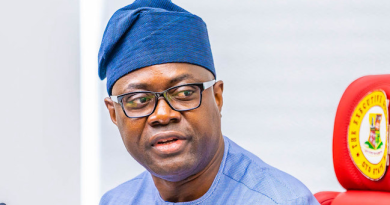Disability Act: CITAB Demands Immediate Enforcement
The Centre for Infrastructural and Technological Advancement for the Blind (CITAB), has commended Hon. Bashiru Dawodu for taking a firm stand against Nigerian ministries, departments and agencies (MDAs) of Government that have failed to implement the Discrimination Against Persons with Disabilities (Prohibition) Act, 2018.
This was contained in a press release issued today in Lagos by Jolomi Fenemigho, the Executive Director of CITAB.
Fenemigho further praised Hon. Dawodu for courageously addressing this issue, which affects not only individuals with visual impairments but the entire community of disabled citizens.
According to him: “Although belated, Hon. Dawodu’s actions are commendable. He has taken an important step in the right direction to ensure that persons with disability can enjoy equal rights and other benefits enshrined in the Disability Act in Nigeria.”
The CITAB boss expressed his concern over the MDAs’ nonchalant attitude towards the Act.
He described this tendency as responsible for undermining the rights and dignity of disabled persons in the country.
He further stated that: “This is a deliberate neglect of our rights as disabled citizens in Nigeria. This system has been complacent, seemingly indifferent to our struggles, while the MDAs operate without accountability.”
Fenemigho also lamented over the MDAs’ indifferent attitude towards the Act’s enforcement and its negative impact on millions of disabled individuals across the country.
He stated: “The Act clearly stipulates a timeline for implementation; yet this has been overlooked, with the MDAs exhibiting a lukewarm approach in enforcing its provisions. This non-compliance jeopardizes the lives and rights of those the Act is meant to protect thereby depriving them of the safeguards that are rightfully theirs under the law.”
Fenemigho also commented on the 10th Assembly’s efforts to safeguard the rights of all disabled individuals in the country.
Said he: “The effort is part of the 10th Assembly’s broader, albeit delayed, attempt to enforce the Act meant to protect the rights of people living with disabilities.”
Fenemigho recalled that despite its passage, the Act’s provisions of safeguarding the rights of disabled persons regarding employment, accessibility, and inclusion in policies and programs remain largely unfulfilled.
He called for the House Committee on Disability Matters to diligently investigate and oversee the activities of the MDAs, ensure regular reports and updates to guarantee adherence to the Discrimination Against Persons with Disabilities (Prohibition) Act, 2018.
He emphasized: “The operations of the MDAs must be closely monitored. A vigilant approach is needed to monitor their activities, with consistent reports and updates to ensure they comply with the provisions of the Act.”
Fenemigho also addressed the general discrimination and stigmatization faced by persons with disabilities in Nigeria, stressing that it is a fallout of the inadequate compliance by both MDAs and the private sector.
He urged immediate action on the part of all stakeholders, warning that continued neglect of the Disability Act would hinder Nigeria’s progress and exacerbate inequalities.
He said, “Despite the existence of laws meant to protect the rights of persons with disabilities, there is still lack of enforcement and accountability. This neglect is not just a bureaucratic oversight but tantamounts to serious injustice that perpetuates inequality and stifles national development. If this negligence continues unchecked, it will deepen existing disparities, further entrench social and economic inequalities. The lack of compliance with disability rights not only affects those directly involved but also reflects poorly on the nation’s commitment to human rights and inclusive development. We therefore call for urgent and decisive action, urging both the government and private sector to address and rectify these failures.”
Fenemigho concluded by advocating for a comprehensive approach to ensure that the rights of persons with disabilities are fully respected and implemented.




